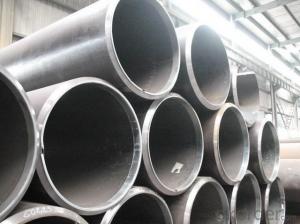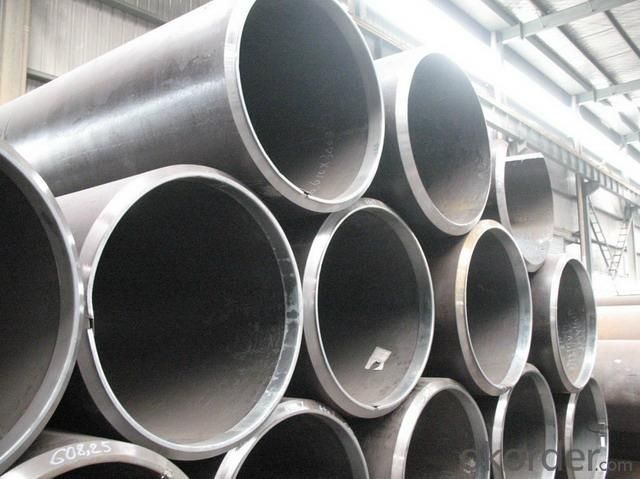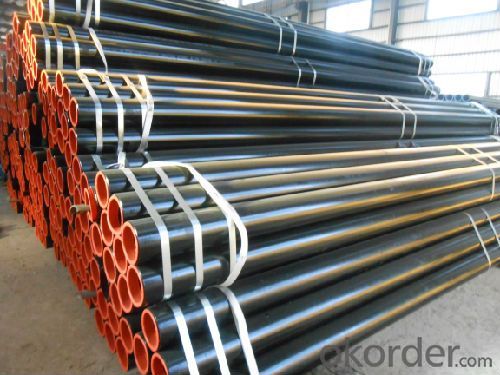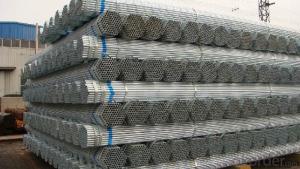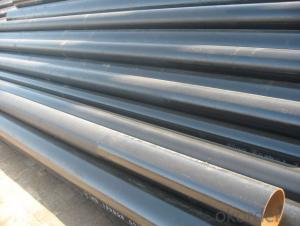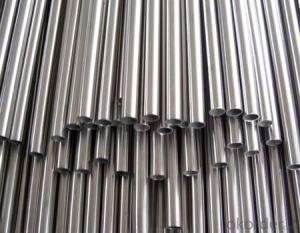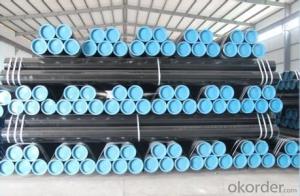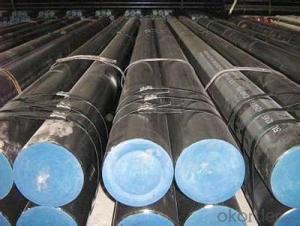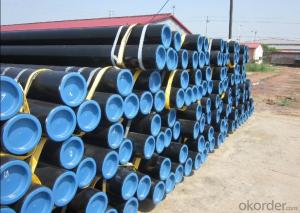Carbon Seamless Pipe with High Quality ASTM A106/53
- Loading Port:
- Tianjin
- Payment Terms:
- TT or LC
- Min Order Qty:
- 20 m.t.
- Supply Capability:
- 9000 m.t./month
OKorder Service Pledge
OKorder Financial Service
You Might Also Like
1、Structure of Seamless Pipe :
Seamless pipe is formed by drawing a solid billet over a piercing rod to create the hollow shell. Usually seamless pipe was regarded as withstanding pressure better than other types, and was often more easily available than welded pipe.
2、Main Features of the Seamless Pipe:
• High manufacturing accuracy
• High strength
• Small inertia resistance
• Strong heat dissipation ability
• Good visual effect
• Reasonable price
3、Seamless Pipe Images:
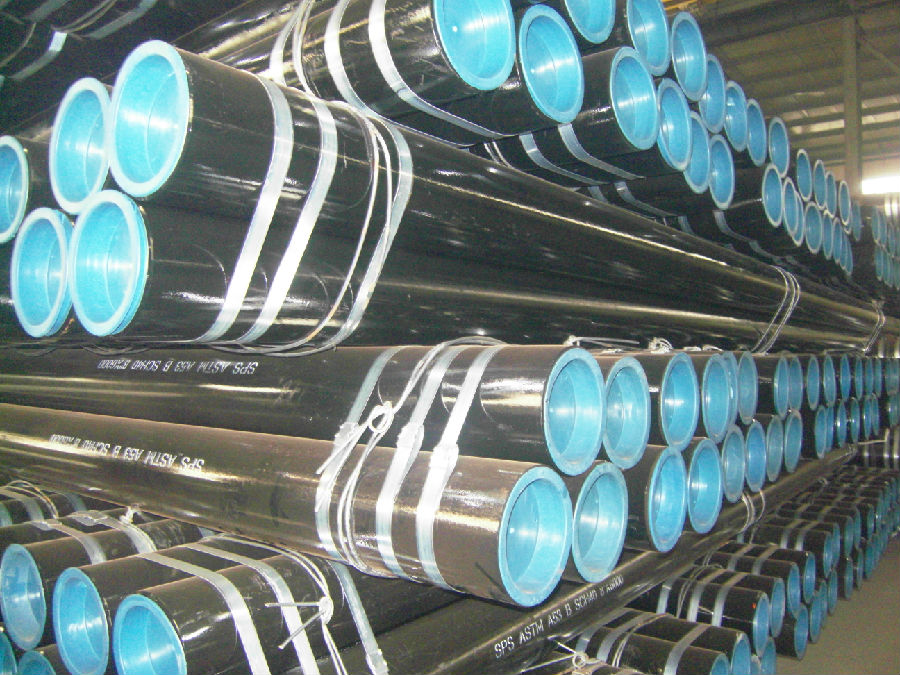
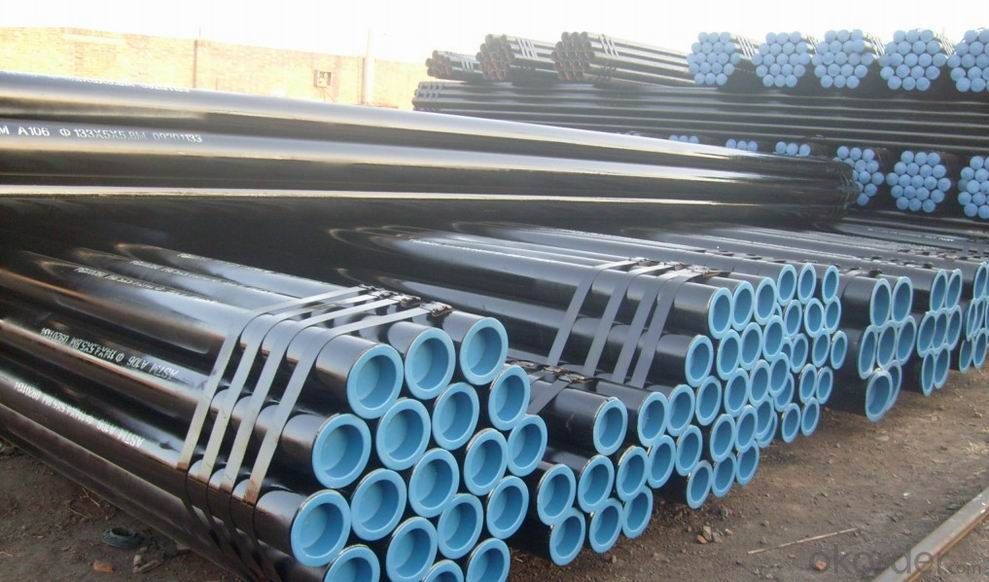
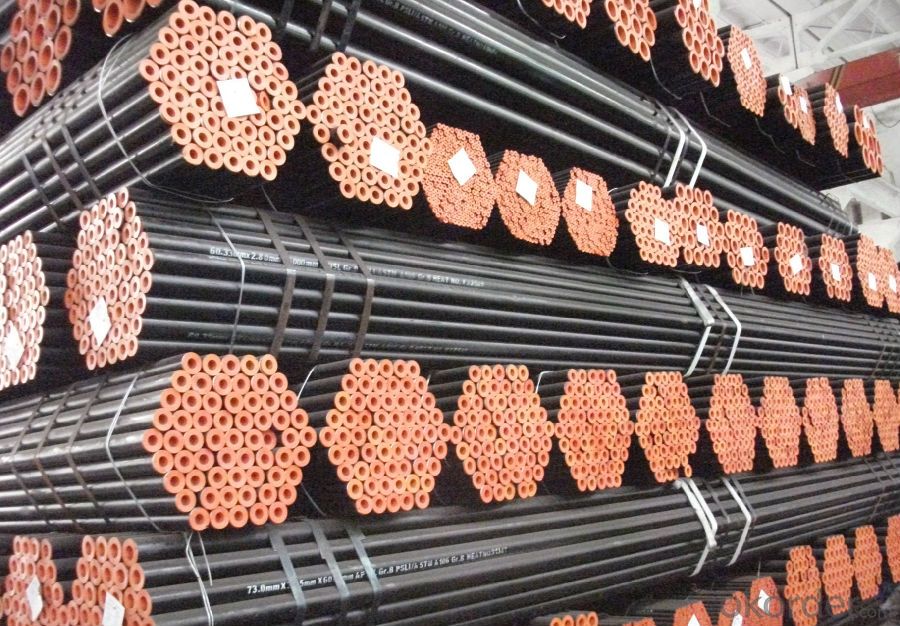
4、Seamless Pipe ASTM A106/53 Specification:
Standard GB, DIN, ASTM
ASTM A106-2006, ASTM A53-2007Grade 10#-45#, 16Mn
10#, 20#, 45#, 16MnThickness 8 - 33 mm Section Shape Round Outer Diameter 133 - 219 mm Place of Origin Shandong, China (Mainland) Secondary Or Not Non-secondary Application Hydraulic Pipe Technique Cold Drawn Certification API Surface Treatment factory state or painted black Special Pipe API Pipe Alloy Or Not Non-alloy Length 5-12M Outer Diameter 21.3-610mm Grade 20#, 45#, Q345, API J55, API K55, API L80, API N80, API P110, A53B Standard ASME, ASTM
5、FAQ of Seamless Pipe ASTM A106/53:
①How is the quality of your products?
If products’ quality don’t accord to discription as we give or the promise before you place order, we promise 100% refund.
②How about price?
Yes, we are factory and be able to give you lowest price below market one, and we have a policy that “ for saving time and absolutely honest business attitude, we quote as lowest as possible for any customer, and discount can be given according to quantity.
③Why should you chose us?
Chose happens because of quality, then price, We can give you both.Additionally, we can also offer professional products inquiry, products knowledge train(for agents), smooth goods delivery, exellent customer solution proposals.Our service formula: good quality+good price+good service=customer’s trust
- Q: How do steel pipes compare to other materials, such as PVC or copper?
- Steel pipes are generally considered to be stronger and more durable compared to materials like PVC or copper. While PVC pipes are lightweight and easy to install, they are not as strong as steel and can be more prone to cracking or breaking. Copper pipes, on the other hand, are known for their corrosion resistance and are commonly used for plumbing systems. However, steel pipes have the advantage of being highly resistant to extreme temperatures, pressure, and damage, making them suitable for a wide range of applications, including industrial and commercial use.
- Q: How do you prevent steel pipes from rusting?
- To prevent steel pipes from rusting, various measures can be taken. One effective method is to apply a protective coating on the surface of the pipes. This can be done using different types of coatings such as paint, epoxy, or zinc. These coatings act as a barrier between the steel and the corrosive environment, preventing moisture and oxygen from coming into direct contact with the metal and causing rust. Another approach is to use corrosion inhibitors. These substances are added to the water or fluid flowing through the pipes to create a protective film on the steel's surface. This film acts as a shield, inhibiting the corrosion process and preventing rust formation. Regular maintenance is crucial in preventing rust on steel pipes. This includes inspecting the pipes for any signs of damage or corrosion and promptly repairing or replacing any compromised areas. Additionally, keeping the pipes clean and dry by removing any accumulated dirt or moisture helps to prevent rust formation. In some cases, it may be beneficial to use stainless steel pipes instead of regular steel. Stainless steel contains chromium, which forms a passive oxide layer on the surface of the metal. This layer acts as a natural barrier against corrosion, making stainless steel pipes highly resistant to rust. Lastly, controlling the environment in which the pipes are installed can also help prevent rust. This can be achieved by maintaining proper ventilation, controlling humidity levels, and avoiding exposure to harsh chemicals or corrosive substances. By implementing these preventive measures, the lifespan and integrity of steel pipes can be significantly extended while minimizing the risk of rust formation.
- Q: How are steel pipes transported and stored?
- Steel pipes are typically transported using specialized trucks, trains, or ships, depending on the distance and quantity. They are often stacked and secured with straps or chains to prevent movement during transportation. Once at the storage site, steel pipes are usually stored in an organized manner, either horizontally on racks or vertically in designated areas. It is crucial to keep them protected from moisture, corrosion, and physical damage, so they are often covered or stored indoors.
- Q: Are steel pipes resistant to electromagnetic interference?
- Yes, steel pipes are generally resistant to electromagnetic interference due to their conductive properties. The metallic nature of steel allows it to effectively shield against electromagnetic waves, making it a suitable choice for applications where electromagnetic interference needs to be minimized or avoided.
- Q: What is the creep resistance of steel pipes?
- The creep resistance of steel pipes refers to their ability to withstand deformation or strain under long-term exposure to high temperatures and constant stress. Steel pipes exhibit good creep resistance due to their high melting point and structural integrity, making them suitable for applications that involve elevated temperatures and prolonged use.
- Q: How do steel pipes handle soil movement?
- Steel pipes are able to handle soil movement effectively due to their inherent strength and flexibility. The sturdy nature of steel allows the pipes to withstand the pressures exerted by soil movement, while their flexibility enables them to adapt and adjust to changes in the soil's position without fracturing or breaking. Additionally, steel pipes can be designed with specific coatings and reinforcements to further enhance their resistance to soil movement, making them a reliable choice for various applications.
- Q: Can steel pipes be used for transporting gases and liquids?
- Yes, steel pipes can be used for transporting both gases and liquids. Steel pipes are highly durable, corrosion-resistant, and have excellent strength, making them suitable for various applications, including oil and gas pipelines, water supply systems, and industrial processes.
- Q: What are the different methods of pipe support for steel pipes?
- There are several methods of pipe support for steel pipes, including clamps, hangers, brackets, and guides. Clamps are used to secure pipes to a structure, while hangers suspend the pipes from overhead supports. Brackets provide lateral support and stability, and guides are used to control pipe movement and prevent excessive sagging. These various methods ensure the proper installation and stability of steel pipes in different applications.
- Q: Are steel pipes resistant to UV degradation?
- Steel pipes are generally not resistant to UV degradation. Exposure to ultraviolet (UV) radiation over time can cause steel pipes to undergo various forms of degradation. UV radiation can cause the steel to become brittle, leading to cracking and potential failure. Additionally, UV radiation can also cause corrosion and discoloration on the surface of the steel pipes. To mitigate the effects of UV degradation, protective coatings or paint can be applied to the steel pipes to provide a barrier against UV radiation. Regular maintenance and inspections are also necessary to identify any signs of UV degradation and take appropriate measures to prevent further deterioration.
- Q: How are steel pipes repaired if they develop leaks?
- Steel pipes can be repaired if they develop leaks through various methods such as welding, clamping, or using epoxy compounds. The specific repair technique depends on the size and location of the leak as well as the type of pipe, and it is typically carried out by trained professionals with the necessary equipment and expertise.
Send your message to us
Carbon Seamless Pipe with High Quality ASTM A106/53
- Loading Port:
- Tianjin
- Payment Terms:
- TT or LC
- Min Order Qty:
- 20 m.t.
- Supply Capability:
- 9000 m.t./month
OKorder Service Pledge
OKorder Financial Service
Similar products
Hot products
Hot Searches
Related keywords
